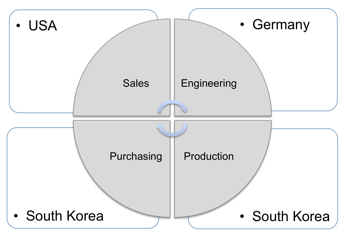Project work is a way of life. Its concept is a result of industrial development with the intent to break down the conventional structures, to remove the communication blockades between the divisions and to enable a better resource allocation within the organization. With the idea "planning before action" (see Wikipedia) the scope and each step will be carefully defined to achieve a particular goal. The concept of project management grants all team members the necessary independence and confidence to carry out their tasks. Prior to implementation the uncertainties of the project environment are reduced as much as possible which helps to keep the project work well under control. As a consequence the PM-standards were created and continuously improved. The urge to perfect the process reflects the desire to increase the freedom of action and to gain satisfaction by completing a task successfully.
There is new spirit related to project work which develops slowly but surely. When does an idea beginn to form? Where should project activities end? What could be the objectives? Where could projects be carried out? Does a project just have a commercial purpose or could it also serve personal interests? Project work is not only a way of working. Project work today is part of a new form of civilization. What is the spirit of the time? Nowadays, cross-national projects are very common. The boundaries of projects have already been expanded. This phenomena is called the global village where we all live today. Even local heroes have to adjust to the global playing ground.
With open borders come along new risk factors due to the bigger territory of project activities for example different interpretations of time, quality and content to name just a few. The possibility of differences and divergent points of view as influencing factors during a project have to be taken into account. The next generation of project managers will represent the zeitgeist of globalization with its characteristics of open systems and diversity. This will lead to a new concept of global project settings. How do different countries define a project concept? Do they all use identical terms? Do all move to the same rhythm? What sorts of differences exist between distant nations? When faced with the unknown or unfamiliar all parties involved have to open up. Diversity of persons and minds could be a key to creativity. But managing this diversity presents a big challenge for any project manager. First of all the borders of the mind have to be removed.

The Role of Diversity in Project Management
Diversity (Wikipedia) is a very useful occurrence. Although since years very popular in human resource management the term "diversity" is rather considered as discrepancy in the industrial transformation and seldom treated seriously. Project managers spend time mainly to construct objective frameworks and practical topics, but avoid to face the impact of human differences on a project. How do human beings figure into a project? Are the team members only another feature in a project plan or are they really performers? Features can be handled by instructions; performers however realize a plan. Human beings are not machines. When treated as such their minds might take over in the end. From this moment on human beings become a risk factor beyond control which might destabilize the entire project structure.
What else is diversity? A global team consists of persons from diverse countries with different customs and mentalities. Diversity includes not only international team members but also their specific way of thinking. Cultural influence includes values, convictions, beliefs, customs and traditions and is often not visible. In contrast the cultural impact on project work is very obvious. How do the stakeholders evaluate the proceedings? What are their priorities? How do they usually communicate with each other? Expert skills can be united but experienced project managers know exactly that each country has its own rules of the game which are part of every culture.
successful cooperation requires professionalism and solidarity. The project's objectives dominate everyday work life. People will rarely take time to share their values and exchange their thoughts. How can people work together, if they remain strangers? How can they be sure that they can count on each other in case of emergency? Team work means trust which leads to autonomous thinking and at the same time to a feeling of security. Creating a global team spirit is the key to project success.
The "Project Patchwork Family"
A global team is similar to a patchwork family (Maurice Halbwachs/Assmann). A global project is the collaboration of cultures, see graphic 1. Diversity of cultures could transform into a danger zone (cultural crash, Hamilton) if not closely monitored. Relationships between teammates and stakeholders need to be cultivated, otherwise they grow apart. Foreign cultures signify indeed strangeness und uncertainty and it might be exhausting to deal with that. Be aware that the others feel as uncertain as you do.
Exactly here exists an interface for getting together. In the beginning of a cooperation people usually tread carefully and gently because of their powerful wish to cooperate. Now is also the best time to build the team spirit. Lay the foundation by making a good impression and any tension later on can be relieved much easier.

The "Project Patchwork Family"
A family without family disputes doesn't exist. Hence dealing with different business cultures in one workplace is undoubtedly hard. However cultures can surely learn to live with each other if they wish to do so. Don't be afraid of cultural chaos. Many conflicts in work could usually be avoided in advance, if only the teammates knew each other better(Huang, 2014). A project team is not just a business feature, it's a social group. Project managers should try and create opportunities for all members to spend time with each other, in person or virtually. This strategy leads to a better mutual understanding in case of (human) errors.
The global environment presents indeed additional uncertainties in comparison to national projects. If we don't try to handle them well they could surely turn into trouble. Project managers have to obtain the proper skills to manage cultures. Cultural management(Huang, 2015) is a significant qualification for global project management.
The world as we have created it is a process of our thinking.
It cannot be changed without changing our thinking.
- Albert Einstein -
Cultural Management as a Discipline
Project work is always done by a team. What motivation drives human beings to work together? The Chinese philosopher Confucius talks about the collectivity of humans and the desire of belonging which is the driving force behind(Huang). This means that actually it's not so much a question of "How can I solve this problem?" but rather "How can WE solve this problem together?"(Harvard concept) At this point the project has finally become not only "mine" but "ours". This association together with the goodwill of all members involved are the beginning of cultural harmonization of a team.
Principles to be applied when cultures meet:
Equality: all are in the same boat, nobody is more valuable than others
Respect and Fairness: respect the difference of cultures, don't try to be a missionary
Courage: face the challenge of uncertainty, try to avoid it upfront or handle it properly, react appropriately to any escalation.
Appreciation: "A person who feels appreciated will always do more than what is expected." ( Author unknown)
Equilibrium: monitor all situations carefully, solve conflicts calmly, be aware of what you can do as well as the real reasons of a conflict and find out who might be able to assist.
Keep an open mind and remain curious, it will increase your potential. Anyway, It takes time to compromise on differences. Of courseThe beginning might be chaotic but the self-organization of human nature (systemic approach) will show the way. In the chaos there are hidden chances waiting to be discovered. Nobody is a born expert of cultures but each effort from your side will be appreciated. Think outside the box and you might grow beyond your perceived limitations. Just be brave and patient! Find out the best "work-rhythm" of your team and move to this rhythm. Then you will create harmony out of chaos.
Literatur:
Wikipedia, "project", http://en.wikipedia.org/wiki/Project, downloaded 2015-10-03
Wikipedia, "Diversity Management", https://de.wikipedia.org/wiki/Diversity_Management, downloaded 2015-10-15
(Confucius) Joanne Huang, "China besser verstehen, interkulturelle Annäherung, Huang+Jaumann, 2016
(Harvard concept) Roger Fischer, Willian Ury, Getting to Yes, 1981, Harvard Law School
( Maurice Halbwachs - Kollektive Wissensvorräte/Assmann - Gedächtnisse, Archie, Roland Hitzler - kleine Lebenswelt, Münch, soziale Millen).
Maurice Halbwachs: Das kollektive Gedächtnis. Fischer, Frankfurt am Main 1991, ISBN 3-596-27359-5.
Jan Assmann: Das kulturelle Gedächtnis, Schrift, Erinnerung und politische Identität in frühen Hochkulturen. Beck, München 1997, ISBN 3-406-42375-2.
Karl Japers: Einführung in die Philosophie, München, 2004
Weitere Expertenbeiträge:
* Versteckte Kosten in internationalen Projekten (Joanne Huang)
* Auslandsaufträge gewinnen und Projekt erfolgreich ausführen (Joanne Huang)



